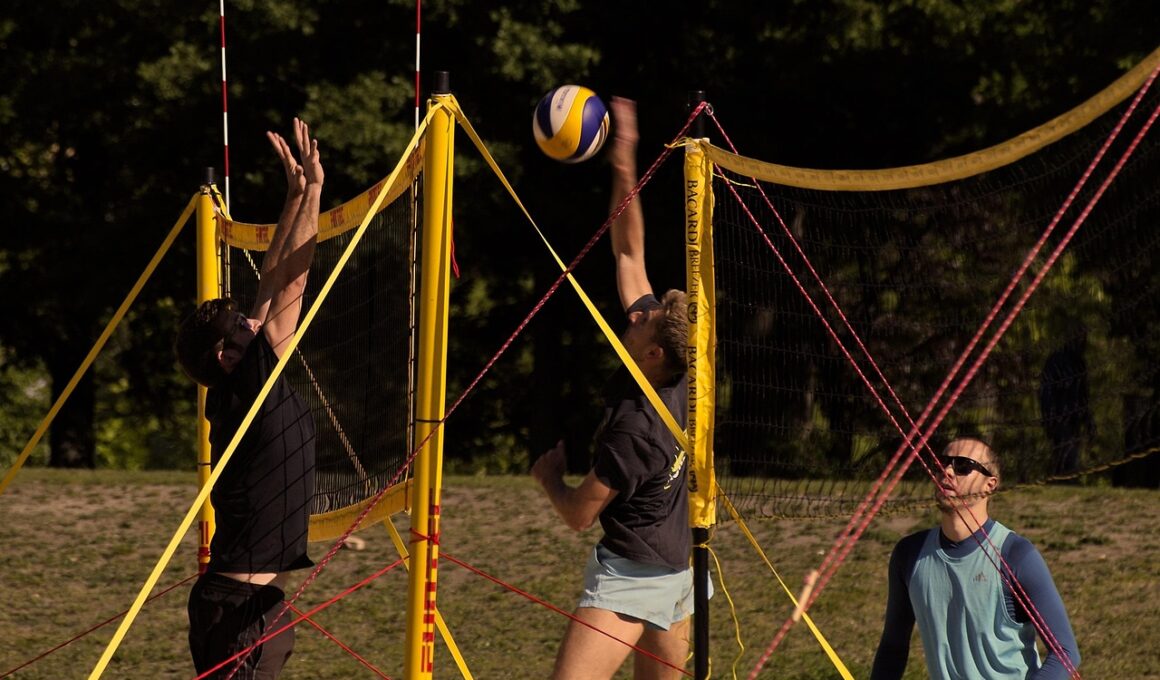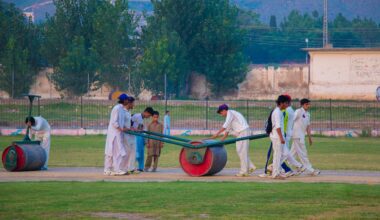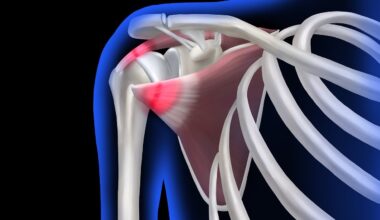Top Nutrition Tips to Boost Your Volleyball Training
When it comes to excelling in volleyball, nutrition plays a pivotal role in training and performance. Athletes should focus on a balanced diet rich in carbohydrates, proteins, and fats. Carbohydrates provide the necessary energy for intense training sessions. Whole grains, fruits, and vegetables should be staples in every volleyball player’s diet. Proteins are crucial for muscle repair and recovery, so including lean meats, fish, legumes, and dairy products helps athletes rebuild after strenuous workouts. Healthy fats found in avocados, nuts, and seeds also support overall energy needs and can help in hormone production. Additionally, hydration cannot be overlooked. Drinking adequate amounts of water before, during, and after training ensures optimal performance and aids recovery. Incorporating electrolytes through sports drinks can benefit sustained exertion. Athletes should also listen to their bodies and adjust their nutritional intake accordingly, depending on training intensity and duration. Maintaining a food diary may help in tracking what works best for personal performance. Ultimately, when nutrition is aligned with training, it not only enhances performance but also boosts overall well-being.
Pre-Training Nutrition
Fueling your body before training sessions is essential for optimal performance on the volleyball court. A good pre-training meal should ideally be consumed one to three hours before the session. This meal should focus on carbohydrates for energy, like oatmeal with bananas or a smoothie made with fruits and Greek yogurt. The carbohydrates help maintain blood sugar levels during training and provide the necessary glycogen for muscle endurance. On top of that, including a small amount of protein can support muscle health. Low-fat options like cottage cheese or a handful of nuts are great additions. Avoid high-fat foods that could slow digestion and lead to discomfort during training. Stay hydrated by drinking water or an electrolyte-rich drink. Incorporating snacks like energy bars or fruit might also improve performance if there’s little time between meals and training. Players should be cautious about trying new foods on training days; sticking to known items helps avoid digestive issues. Understanding how your body reacts to food choices is crucial to finding the right pre-training formula for individual needs.
During training, maintaining energy levels is crucial for volleyball performance. Players often overlook the importance of nutrition while actively engaged in practice or drills. Consuming small amounts of easily digestible snacks during long training sessions helps provide an energy boost. Foods like bananas, energy gels, and granola bars can replenish glycogen stores, which are vital for sustaining energy through rigorous activities. It’s also helpful to sip on electrolyte drinks to replace lost minerals during exertion. Staying hydrated ensures that athletes maintain peak performance and reduces the risk of cramps and fatigue. It’s important to balance hydration with the individual’s sweat rate; each player will sweat differently based on their effort and environmental conditions. Volleyball training can be physically taxing, and any lag in energy can affect performance. Regular breaks should be scheduled to hydrate and take in essential snacks. Time management is key; practice sessions should integrate these small nutrition breaks for maximum effectiveness. A quick snack will keep energy levels high, resulting in improved focus and performance on the court.
Post-Training Nutritional Strategies
After intense volleyball training, the body begins its recovery process, which is when nutrition becomes essential. Consuming a balanced meal within 30 minutes of finishing a training session promotes muscle repair and replenishes glycogen stores. This meal should contain a combination of carbohydrates and proteins. Grilled chicken with brown rice or a protein shake blended with fruits are perfect examples. Some athletes prefer to indulge in smoothies packed with protein powder or Greek yogurt to further enhance recovery. Hydration after training is equally important; players should continue to drink water or electrolyte drinks to restore lost fluids. Recovery bars can also be beneficial, but they need to be chosen wisely to avoid overly high sugar content. Refueling after training helps reduce muscle soreness and fatigue, making it easier to prepare for the next session. Players should also consider their individual dietary requirements and preferences. However, the priority should always be on whole foods as they have a higher nutritional value than processed options. Keeping track of recovery nutrition allows athletes to fine-tune their post-training strategies.
Incorporating essential vitamins and minerals into a volleyball athlete’s diet can dramatically impact overall performance. Nutrient-rich foods can optimize bodily functions and enhance energy production. Magnesium, zinc, and calcium are critical components that help in muscle contraction, repair, and energy metabolism. Leafy greens, nuts, seeds, and dairy contribute significantly to these nutrients. Vitamin D is paramount for calcium absorption and supports bone health, which is essential for any athlete, especially in high-impact sports like volleyball. Foods like fatty fish and egg yolks are excellent sources of vitamin D. Moreover, don’t forget about the benefits of antioxidants found in colorful fruits and vegetables. Berries, tomatoes, and bell peppers can help fight inflammation and support recovery. Ensuring that daily meals are colorful can be a fun and effective way to ensure the inclusion of various vitamins and minerals. Additionally, players may consider consulting with a nutritionist or sports dietitian to tailor their diets specifically to their needs. Supplements should only be used after discussing potential benefits with a healthcare provider.
Hydration Tips
Hydration is arguably one of the most important, yet often neglected aspects of a volleyball athlete’s nutrition. Proper hydration before, during, and after training is critical for maintaining peak performance. Water should be the primary source of hydration; however, during long or intense training sessions, it may be beneficial to supplement with electrolyte drinks to replace sodium and potassium lost through sweat. Athletes often misjudge their thirst signals, leading them to become dehydrated before they even feel thirsty. A proactive approach involves drinking water consistently throughout the day, not just during training sessions. Monitoring urine color can offer a useful gauge of hydration status; pale yellow indicates adequate hydration, while darker tones suggest a need for more fluids. Avoiding excessive caffeine and alcohol, particularly before training, can also help in achieving optimal hydration. Implementing a hydration schedule, where athletes drink at specific intervals, ensures they stay ahead of their fluid needs. Understanding one’s personal hydration requirements can heavily influence endurance and performance levels on the volleyball court.
Lastly, mental preparation and focus can significantly enhance training outcomes. Nutrition isn’t solely about physical energy; it also impacts cognitive function and mental sharpness. Consuming foods rich in omega-3 fatty acids, such as fish, walnuts, and flaxseeds, can improve brain health and cognitive functioning. Keeping the mind sharp is just as important as the body when it comes to volleyball. Foods that are rich in complex carbohydrates and proteins dictate blood sugar levels and improve overall mood stability. Implementing a regular eating schedule within your training routine can lead to enhanced focus and motivation. Simple practices, like prepping meals and snacks beforehand, can eliminate last-minute poor eating choices. Mindful eating—being conscious of what you eat—can also help improve the relationship with food and prevent emotional eating. Players may even benefit from practicing mental exercises alongside their physical training. Engaging in meditation or visualization techniques can help solidify the connection between nutrition and sports performance, leading to an overall more fulfilling training experience.
At the end of the day, good nutrition is about developing habits that improve both volleyball skills and overall health. Integrating these tips into a daily routine can create sustainable energy levels essential for lasting performance. Remember, it’s not just about eating; it’s about eating right for your needs as a volleyball player. Building a strong nutritional foundation helps prevent injuries, boosts recovery, and can lead to better game day success. Prioritizing meals that are both nutritious and enjoyable ensures long-term commitment to dietary habits. Keeping track of changes and their impact on performance may prove to be insightful for optimizing training. With the right nutritional approach, volleyball athletes can look forward to enhanced performance both in the training setting and during competitions. Staying adaptable and open to continuous learning about nutrition is crucial as new scientific insights emerge. Lastly, athletes are encouraged to have fun with food by experimenting with new recipes and flavors while focusing on their training goals. Finding the right balance between nutrition and training empowers athletes to reach new heights in their volleyball career.


